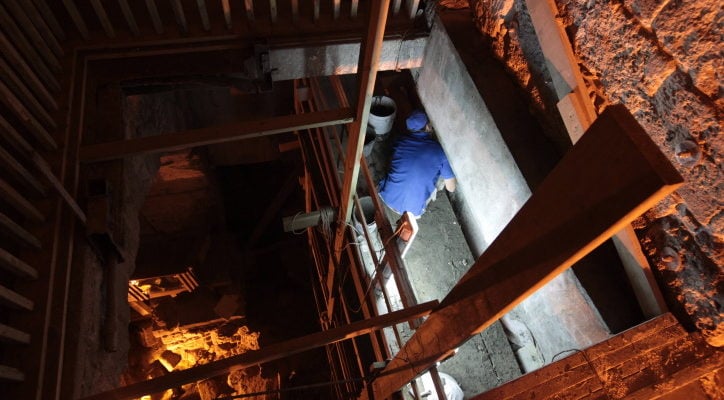The Antiquities Authority caught the robbers red-handed as they burrowed into a 2,000-year-old cave.
By Batya Jerenberg, World Israel News
A father and son hiking in the Judean hills alerted the Israel Antiquities Authority (IAA) after seeing signs of suspicious activity near a cave they had gone to visit, leading to the capture of a gang of Arab antiquity robbers last week, Makor Rishon reported Friday.
Assaf Freuter, 12, an enthusiastic hiker and biker, had begged his father Roi to go cave exploring with him last month. Roi, a junior high school teacher who takes students all over the country to learn about Israel’s history via hikes and mutual bonding, agreed despite being unenthusiastic about crawling into caves.
They found an interesting-looking site online, biked to the area, scrambled through thorn bushes and climbed high terraces to get to the cave – just to see that its top section had collapsed, leaving them no way to get in. But Roi noticed a strangely placed tree trunk nearby and food scraps scattered around, leading him to suspect that others were searching the area who may be up to no good.
He called the IAA, which sent a team immediately and confirmed his suspicions. They lay a trap and two weeks later caught a gang red-handed, which had managed to find a hidden side tunnel into the cave and were digging for antiquities they could sell on the black market.
Uzi Rotstein, one of the IAA inspectors in the operation, explained that the robbers were well known in the antiquities field, for all the wrong reasons.
“In this area there are several families of antiquity robbers from three villages in the South Hebron Hills,” he explained. “They look for burial caves because Jews used to be buried in caves with their personal possessions, jewelry, etc., but the big money is in coins.”
The most sought-after kind of money is from some 2,000 years ago, the period when the Romans conquered the country and the Jews mounted a short-lived rebellion, he said.
“The Judean Plains is a very attractive area for archaeological research, because there were Jewish settlements there from the time of the Second Temple and the Bar Kochba Revolt,” he said. “It’s the most robbed area in the country.”
The IAA believes that the cave that Assaf and Roi visited was used by Jewish fighters as one of many hiding places in the region, when whole families lived underground.
Freuter was very proud of his son, who received a certificate of appreciation signed by the head of the IAA for “exhibiting good citizenship that aided capture of suspects violating the Antiquities Act.”
“I was very happy that Assaf insisted on getting to the cave,” he said. “I already wanted to give up the whole idea. He loves hiking all over the land and his stubbornness and curiosity … led at the end to the discovery of the tunnel and the arrest of the antiquity thieves.”




